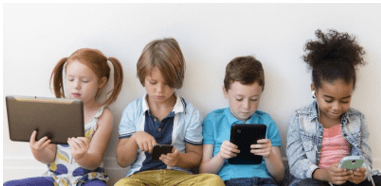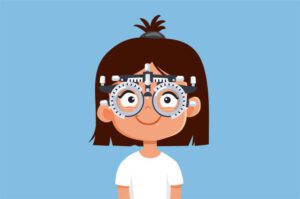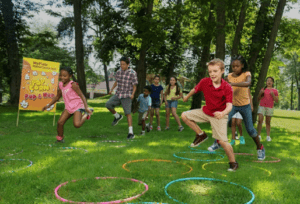Your Children and Screen Time
In this digital age, most people including our children have access to an electronic device right in their pocket. Devices are useful tools for learning and entertainment but also are a source of eye strain, a distraction, and a form of behaviour management in children as young as 6 months old.

What possible effect is this having on your child’s development?
Technology can hinder a child’s development as it minimises the time they spend interacting with people and the world around them. This leads to social, behavioural, and academic issues later in life. Rather than staying inside on a device, kids should be encouraged to play outside or engage in physical activities. In social settings, encourage conversation, playing with other children or engaging in imaginative play.
Technology has also played a role in the decline in comprehension and literacy in children. According to the Australian Research Alliance for Children and Youth, 1 in 3 Australians (30%) have literacy skills low enough to leave them vulnerable to unemployment and social exclusion. Devices provide entertainment and the bright lights and sounds provide ‘rewards’ creating a dopamine high; reducing a child’s desire to read a book, write stories or keep a journal.

Early exposure to screen time can be detrimental to the visual health of children. When young eyes are engaging in outdoor activities or looking out the window of a car, their long-distance vision is developing and strengthening. Whereas, spending the majority of the time focusing on a screen within 40cm of their eyes develops visual limitations such as over convergence of the eyes, eye strain from glare, migraines, or myopia.

What is Myopia?
Myopia also known as short-sightedness is a common eye condition which causes distance vision to appear blurred. This is because the light that travels through the eye doesn’t focus on the retina (back of the eye); it focusses forward of the retina, which prevents the person from seeing a clear image. Myopia is commonly picked up in children and requires glasses, contact lenses or (when an adult) refractive surgery to obtain normal distance vision. The younger a child is when they develop myopia the more likely and the further it progresses. Progression can be slowed and, in some cases, halted by use of overnight correction lenses, pharmacological agents, specially designed peripheral defocus glasses, specialty contact lenses and vision therapy.
Signs and Symptoms of Myopia:
- Squinting eyes to see distant objects.
- Difficulty seeing whiteboard at school.
- Poor posture while reading.
- Lack of interest in playing outdoors.
- Headaches and sore eyes (eye rubbing).
- Blurred distance vision at night.

Australasian College of Behaviour Optometry’s Screen Time Exposure Recommendations.

So how can you manage your child’s screen time and visual health?
If your child is using a device, we recommend adjusting the brightness of the screen to a darkened hue and avoid using them in bright areas like outside to reduce glare and eye strain. Maintaining a healthy posture is also important for your child’s working distance as they grow. Keep the device beyond elbows length away from their eyes and raised to jaw height: not down on their lap. This will help prevent postural adaptations such as scoliosis which may result in neck and back pain or migraines issues later in life.
Have set rules of use. Use a timer to ensure your kids have breaks from using devices or to limit the overall amount of time they engage with a device in one sitting. An easy rule to remember is 20-20-20. Every 20 minutes, look about 20 feet away for 20 seconds. This gives the eyes a break from converging inwards to look at the up-close screens and can prevent eye strain. Every hour spent using a screen should be matched with an hour of outside activity.

Have set activities outdoors or crafts to keep the kids away from the screens. Remind them that there is fun to be had in the real world. Kids can develop brilliant imaginations when playing outside or with physical toys, additionally this can lead to increased creativity and other key characteristics to be successful in adulthood and the workplace.


If you are having concerns about your child’s vision, contact us to book a consultation. For general information on children’s vision click HERE.